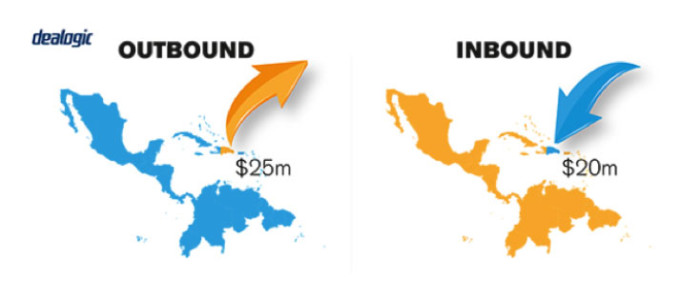
Invertir en República Dominicana
June 13, 20152015 Mergers and Acquisitions Report: Dominican Republic – Part 2
June 24, 2015Thania Gómez Muñoz, Paulo Alves and Harje Johannes Kjellberg of Proxies Law & Business assess the regulatory landscape for mergers and acquisitions in Dominican Republic
- REGULATORY FRAMEWORK
1.1 What legislation and regulatory bodies govern public M&A activity in your jurisdiction?
M&A is regulated in the Dominican Republic by different regulations and regulators. At present, there are no public companies in the Dominican market, even though the legal framework authorises them. Securities activities are regulated by the Securities Superintendence of the Dominican Republic and by the Securities Law (Law 19-00) and its regulations (Decree 664-12). There is a draft bill for the modification of the Securities Law (Draft), which is expected to be considered by Congress during 2015. The Draft provides for more regulations regarding the execution of public M&A operations.
In addition, regulated markets, such as telecommunications, energy, banking and insurance, are subject to special regulations for the performance of M&A operations, which include their prior authorisation of the correspondent regulatory entity.
Regarding private M&A activities, the parties have the liberty to contractually determine the applicable law for the transaction, as well as the forum for presenting any disputes regarding the matter.
Finally, it is worth indicating that the Dominican Tax Code (Law 11-92) and the Dominican Companies Law (Law 479-08) also provide governance on the matter. In particular, every M&A activity is subject to review and authorisation by the directorate general of internal revenues.
1.2 How, by whom, and by what measures, are takeover regulations (or equivalent) enforced?
There are no regulations for the performance of a takeover in the Dominican Republic. However, in accordance with the Draft, the Securities Superintendence is the institution responsible for setting up and enforcing takeover regulations. In addition, the Securities Superintendence is responsible for approving or denying the authorisation required to initiate a takeover in the Dominican Republic.
Despite the lack of a governmental regulation of takeovers, practice provides that by means of contractual autonomy-of-will, by-laws and shareholders’ agreements provide mechanisms to regulate the change of control of a legal entity, including dispute resolution, deadlock remedies, and restrictions on transfer of shares.
In the same manner, the Dominican Companies Law provides disposition on the government and regulations for corporations, including dispositions for the protection of minority shareholders, such as information rights, preemptive rights and legal actions against the administrators and shareholders that fail to protect the interests of the company.
- STRUCTURAL CONSIDERATIONS
2.1 What are the basic structures for friendly and hostile acquisitions?
As a result of the non-existence of public corporations in the market, M&A activities are regularly structured as either an equity operation, where the buyer purchases equity interests in a target company, or as an asset purchase, where the buyer acquires operating assets of the target company.
In addition, it is worth noting that in the Dominican Republic, the shareholders and the members of the board are either the same persons or are closely related. As a result, provided that there is an offer for the acquisition of the company, the shareholders and the members of the board are likely to collaborate in the process.
2.2 What determines the choice of structure, including in the case of a cross-border deal?
The fiscal and civil liabilities of the acquiring assets would trigger the buyer to decide for either an asset purchase or an equity acquisition. As provided by the Draft, in the event of its approval, the determination of the adequate structure will be subject to the fulfillment of the Dominican regulations that are applicable to the scenario.
2.3 How quickly can a bidder complete an acquisition? How long is the deal open to competing bids?
As there are no regulations on the matter, the process is subject to the negotiations of the contracting parties. In the event of the acquisition of the share of a corporation (sociedad anónima), if there exists a limitation to the transfer of the shares, the corporation should deliver an answer within 30 days of receipt of the notification. For limited liability companies (sociedad de responsabilidad limitada), the process could last up to three months.
Generally, the parties execute a preliminary agreement, such as a letter of intent or a memoradum of understanding, which includes the actions that will be taken by the parties during the negotiation process and their timing of performance. An exclusivity clause is usually included in the preliminary agreements, which will reduce the risk of the process receiving competing bids.
2.4 Are there restrictions on the price offered or its form (cash or shares)?
In the Dominican Republic, there are no limitations to the form or the price of the shares offered. However, the tax authorities are required to supervise the transfer of shares and the price of the transfer should be a reasonable price. In deals including related parties, it is very important to consider the transfer pricing provisions.
2.5 What level of acceptance/ownership and other conditions determine whether the acquisition proceeds and can satisfactorily squeeze out or otherwise eliminate minority shareholders?
In the case of limited liabilities companies (SRL), the transfer of a share to a third party that is not a shareholder of the entity counts with the approval of at least three-quarters of the shares of the legal entity. In the case of corporations (SA), there is no legal disposition regarding such operation. Nonetheless, it is common that shareholders agreements and by-laws include dispositions regarding drag-along rights in favour of majority shareholders.
2.6 Do minority shareholders enjoy protections against the payment of control premiums, other preferential pricing for selected shareholders, and partial acquisitions, for example by mandatory offer requirements, ownership disclosure obligations and a best price/all holders rule?
No, in the Dominican Republic there are still no special dispositions regarding special protections to minority shareholders such as payments of control premiums and other preferential pricing.
The provisions of minority shareholders consist in the recognition of the same rights of the rest of the shareholders, and the access to the financial information of the legal entity (provided that the minority shareholder possesses at least five percent of the shares).
2.7 To what extent can buyers make conditional offers, for example subject to financing, absence of material adverse changes or truth of representations? Are bank guarantees or certain funding of the purchase price required?
It is possible to make conditional offers and such limitations are regularly applied. In order to limit the scope of the conditions and to settle a timeframe, normally the parties execute a preliminary agreement (term sheet agreement) indicating the terms and conditions of the conditional offer and agree on the use of an escrow account, bank guarantee or the advance of a non-refundable down payment at the moment of execution of the preliminary agreement.
- TAX CONSIDERATIONS
3.1 What are the basic tax considerations and trade-offs?
Under the Tax Code every transfer of shares is subject to the payment of taxes in the Dominican Republic, including the transfer of shares of an offshore corporation the underlying assets of which are located in the Dominican Republic. In this regard, the Tax Code states that the buyer and the seller will be jointly liable for any capital gain generated by the seller due to the transfer of either shares or assets. As a result, it is a main concern for the buyer that the seller pays the applicable capital gains taxes of the operation.
In the event the operation was conducted by means of an equity transfer, the applicable tax is one percent of the purchase price, which corresponds to the capital gain to be generated from the transaction.
If the operation was conducted by means of an asset transfer, a special tax correspondent at three percent of the operation is applicable to the transfer of registered goods, such as land and vehicles (two percent). In addition, a significant proportion of goods are subject to the payment of VAT, which adds up to 18% of the transfer price. In this scenario, the Law requires the payment of the transfer taxes in order to formalise the transfer of registered properties.
Finally, it is worth taking into consideration that in the Dominican Republic, the statute of limitation for tax contingencies is three to five years, depending on if a tax return has been filed or not.
3.2 Are there special considerations in cross-border deals
No, there are no special dispositions for cross-border deals. The considerations explained in 3.1 are also applicable to cross-border deals.
- ANTI-TAKEOVER DEFENCES
4.1 What are the most important forms of anti-takeover defences and are there any restrictions on their use?
Please refer to section 1.2.
4.2 How do targets use anti-takeover defences?
Please refer to section 1.2.
4.3 Is a target required to provide due diligence information to a potential bidder?
Please refer to section 1.2.
4.4 How do bidders overcome anti-takeover defences?
Please refer to section 1.2.
4.5 Are there many examples of successful hostile acquisitions?
No, there are not. Please refer to section 1.2.
Artículo completo:
![]() 2015 Mergers and Acquisitions Report: Dominican Republic
2015 Mergers and Acquisitions Report: Dominican Republic




